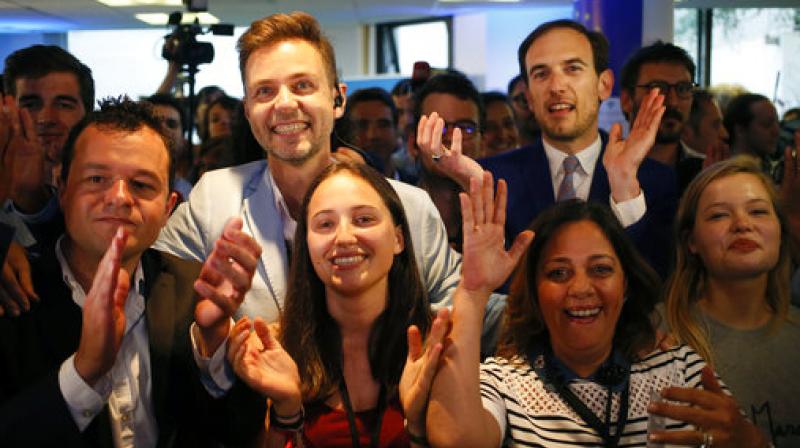France elects record number of women to parliament

Paris: France voted a record number of women into parliament on Sunday, thanks largely to President Emmanuel Macron’s decision to field a gender-balanced candidate list for his victorious Republic on the Move (LREM) party.
As of late Sunday evening there were 156 women lawmakers elected to France’s National Assembly, already more than ever before, and with 148 seats as yet undecided.
Catherine Barbaroux, LREM’s acting president, hailed the increase of women’s share of parliamentary seats.
“For the first time under the Fifth Republic, the National Assembly will be deeply renewed more diverse, younger,” she said. “But above all, allow me to rejoice, because this is a historic event for the representation of women in the National Assembly.”
Female parliamentary representation has increased steadily in France in recent years, with the 2012 elections seeing a record 155 women 26.9% percent voted in, up from 18.5% in the 2007 elections and 12.3% in 2002.
Yet although France has a system in which funding for political parties is restricted if women do not make up at least 49% of its parliamentary candidates, most parties still put up more men for election.
Even where women are put up for election, they tend to be in constituencies where they are unlikely to win, keeping the numbers of women who make it to the Palais-Bourbon low.
“En Marche...proactively decided to give winning seats to women,” said 34-year-old Brune Poirson, who beat the FN to be elected to parliament in the Vaucluse district in southeastern France. “This is a really bold move.”
“Normally political parties allocate women seats that are almost impossible to win, so they can say ‘hey, we have as many female candidates as male,’ but at the end of the day they never end up winning,” added Poirson, who has no prior parliamentary experience but has master’s degrees in political science from both Harvard and the London School of Economics.
Poirson decided to become a candidate in January when Macron sent a video to party members urging more women to put themselves forward. “(Macron) said: this is your responsibility as well we need you. It was very powerful, and it really worked,” she told Reuters.
A macho culture in the upper echelons of power has characterised French politics in the past, but there have been signs in recent times that the veil is lifting on acts that would previously have gone unreported.
Last year Denis Baupin resigned as vice-president of the National Assembly after being accused of sexual harassment by fellow politicians. Shortly after that, the then finance minister Michel Sapin admitted to behaving inappropriately toward a female journalist.
33-year-old Laurianne Rossi, a former assistant to a Socialist senator who was elected to Hauts-de-Seine, on the Western outskirts of Paris, said even with the increase in female lawmakers, it would take time to make a real difference.
“There is still a long way to go before we get real equality between women and men in France (but) the arrival of so many more women at the National Assembly will really help,” she said. Frances Scott, founder of Britain’s 50:50 Parliament, a cross-party group campaigning for gender balance in parliament, said the number of women elected would spur parties in other countries to field more female candidates.
Britain set its own record in elections on June 8, with 30% of parliamentary seats going to women.
“It looks like France is leading the way in terms of this democratic imperative,” said Scott. “The evidence suggests that having more women in parliament leads to more informed and more responsive decision-making. It leads to a better parliament.”

